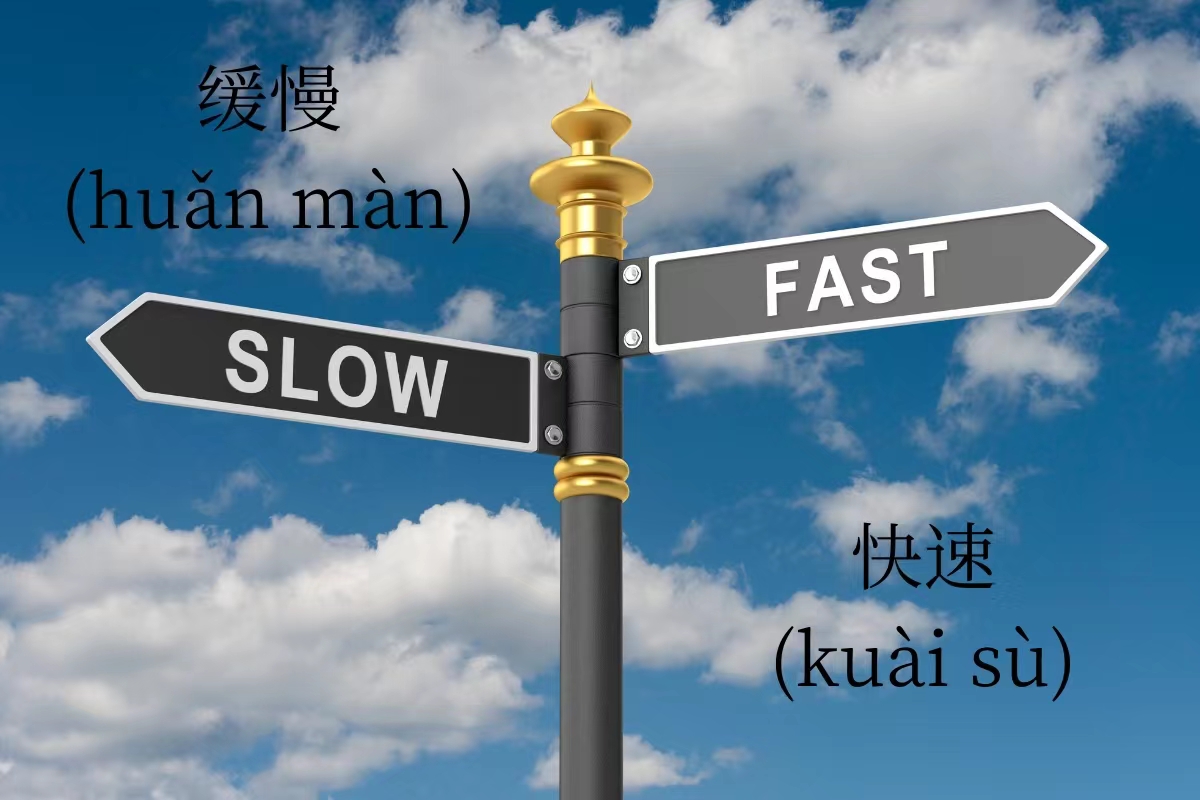HSK Words: 缓慢 (huǎn màn) VS 快速 (kuài sù)
In Chinese language learning, the HSK words 缓慢 (huǎn màn) and 快速 (kuài sù) are often contrasted, as they represent opposite concepts of speed. However, their usage and contextual meanings can vary. In this article, we will clarify the differences between these two words to enhance understanding and avoid confusion.

缓慢 (huǎn màn) implies a slow or gradual nature, usually in terms of movement, action, or progress. It suggests that something or someone is not rapid or hurried, but rather deliberate and cautious.
Examples:
- The train slowly pulled into the station.
火车缓慢地驶进车站。
huǒ chē huǎn màn de shǐ jìn chē zhàn。 - His response was very slow, requiring more time for reflection.
他的反应非常缓慢,需要更多的时间来思考。
tā de fǎn yìng fēi cháng huǎn màn , xū yào gèng duō de shí jiān lái sī kǎo 。 - The project is progressing rather slowly and needs to be expedited.
这个项目进展得相当缓慢,需要加快进度。
zhè gè xiàng mù jìn zhǎn de xiāng dāng huǎn màn,xū yào jiā kuài jìn dù。
快速 (kuài sù) implies a quick or rapid nature, usually in terms of speed or efficiency. It suggests that something or someone is fast or prompt, often with a sense of urgency or immediacy.
Examples:
- The plane flew quickly across the sky.
飞机快速地飞过天空。
fēi jī kuài sù de fēi guò tiān kōng 。 - His response was very quick, showing his agility in reacting.
他的回答非常快速,显示出他反应敏捷。
tā de huí dá fēi cháng kuài sù,xiǎn shì chū tā fǎn yìng mǐn jié。 - Quick reading can help improve learning efficiency.
快速阅读有助于提高学习效率。
kuài sù yuè dú yǒu zhù yú tí gāo xué xí xiào lǜ。
In conclusion, 缓慢 (huǎn màn) and 快速 (kuài sù) are opposites in Chinese, indicating different degrees or qualities of speed or efficiency. Understanding their distinct meanings and appropriate usage can help avoid confusion in language comprehension and expression.
Quiz: Please consider whether to use 缓慢 (huǎn màn) or 快速 (kuài sù) in the following sentences.
- 他因为腿不方便而行走_____。
tā yīn wèi tuǐ bù fāng biàn ér xíng zǒu _____。 - 网球运动需要大量_____而剧烈的动作。
wǎng qiú yùn dòng xū yào dà liàng _____ ér jù liè de dòng zuò。 - 他讲话_____而抑扬顿挫、把握有度。
tā jiǎng _____ màn ér yì yáng dùn cuò、bǎ wò yǒu dù。
Answers:
- 缓慢 (huǎn màn)
- 快速 (kuài sù)
- 缓慢 (huǎn màn)